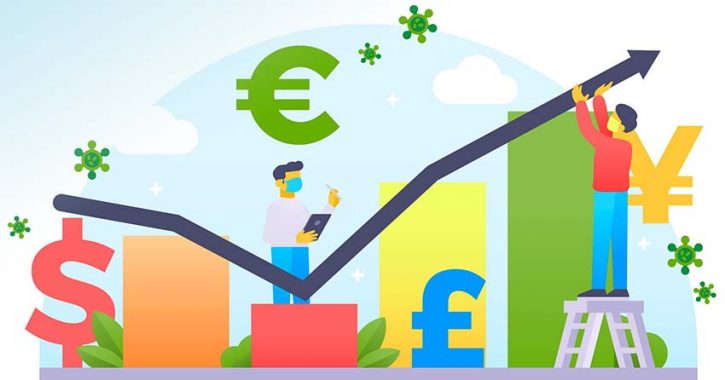 Kattintson ide a magyar verzióért.
Kattintson ide a magyar verzióért.
The ongoing global pandemic has amplified the interest and awareness towards ESG investing. COVID-19 has affected virtually all areas of our lives, causing a global health and economic crisis, and pushing investors, policy makers and companies to rethink their expectations.
The meaning of ESG is frequently presented in two different dimensions. First, it allows investors to align their investments with their values or beliefs. Second, through the integration of its principles, it promises to better mitigate risks arising from ESG factors, as in, by investing in companies with strong ESG practices our portfolios could become more resilient to crises and shocks.
We examine how the economic impacts of COVID-19 can be placed into an ESG framework, and how sustainable investments performed since the outbreak of the pandemic.
Effects of COVID-19 in an ESG framework
E: the Environmental pillar
Climate change and environmental issues covered by the E in ESG have long been the dominating topic of sustainable investing. When we think about the environmental impact of the pandemic, the first conclusions were usually positive, such as the drop in greenhouse gas emissions and energy consumption. This initial positive impact and other (social and governmental) issues seem to have taken the spotlight from the big E. However, according to a new ’United in Science 2021’ report, emissions are now back at or even above pre-COVID levels, and nowhere close to reduction targets. The UN-sponsored agencies issuing the report are warning us that it is time to put climate change back to the top of the agenda.
S: the Social pillar
The S in ESG is often deemed less significant and vaguely defined, yet it has emerged as a critical element amid the pandemic. Practices and policies concerning labour management, employee health and safety have been put under tremendous pressure. Lockdown measures have forced companies to quickly adapt and change the ways they work, manage their workforce or supply chains. Examples include implementing working from home programs and remote business models, where possible. We should not forget that these models are not universally applicable. Countries and sectors less equipped to deal with the crisis have seen surging unemployment, hiring freezes, and increasing inequality.
G: the Governance pillar
The role of Governance can not be overemphasized when navigating through times of crisis. The G in ESG relates to the management systems used to ensure companies’ resilience, contingency planning and readiness to manage critical incidents. Firms need to create and maintain a safe and healthy environment for their workforce, and plan for the likely scenario that the coronavirus is here to stay.
Operational efficiency and strong balance sheets are also fundamentally important governance factors that are crucial during the economic and financial turmoil caused by the virus.
Investment performance
In late February and March 2020, major stock indices have dropped by 20 to 30%, which has been identified as the first sign of a global economic recession induced by COVID-19. To evaluate investment performance, we used Morningstar’s research on passive equity ETFs tracking broad market indices as proxies for ESG and conventional investing strategies. The data shows that investments in sustainable and ESG funds have weathered this huge global market downturn better. In Europe, the USA and across global developed markets, ESG and sustainable funds have outperformed their non-ESG equivalents. The only exception was the emerging markets equity category, where fewer than half of the ETFs showed outperformance.
| Asset Class |
Proportion of Sustainable Funds
outperforming benchmark |
| US Large Cap Equity: |
64% |
| Europe Large Cap Equity: |
77% |
| Global Large Cap Equity: |
80% |
| Emerging Markets Equity: |
29% |
From a return perspective, sustainable equity funds recorded a generally strong year in 2020. Morningstar’s research paints a positive picture for sustainable index funds that are closely comparable for traditional index funds that invest in the USA, developed markets outside the US and emerging markets:
| United States |
Performance in 2020 |
| Sustainable Index Funds Average |
22,35% |
| Ishares Core S&P 500 ETF |
18,37% |
| Developed Markets ex US |
Performance in 2020 |
| Sustainable Index Funds Average |
11,99% |
| Ishares Core MSCI EAFE ETF |
8,55% |
| Emerging Markets |
Performance in 2020 |
| Sustainable Index Funds Average |
21,22% |
| Ishares Core MSCI EM ETF |
18,18% |
Generally speaking, investors who have chosen such ESG investment products could achieve better performance while maintaining broadly diversified exposure similar to traditional index funds. Even if this can partly be attributed to factors like sector biases and the current popularity of sustainable investing that is driving up asset prices. The long-term picture of ESG’s added value is yet to crystalize, but these results indicate that placing an emphasis on investing in companies with good ESG attributes can enhance and protect returns in an uncertain economic environment.
Sources:
https://www.morningstar.com/insights/2021/02/08/morningstars-esg-indexes-have-outperformed-and-protected-on-the-downside
https://www.morningstar.co.uk/uk/news/201154/how-esg-etfs-have-performed-in-the-sell-off.aspx
https://www.morningstar.com/articles/1017056/sustainable-equity-funds-outperform-traditional-peers-in-2020
https://www.unep.org/news-and-stories/press-release/covid-19-caused-only-temporary-reduction-carbon-emissions-un-report
https://am.jpmorgan.com/jp/en/asset-management/institutional/insights/market-insights/market-updates/on-the-minds-of-investors/covid-19-esg-matters/
covid-19-esg-four-dimensions.pdf (ssga.com)



